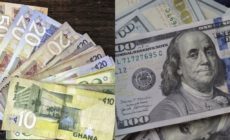Cedi records impressive stability in Q1 of 2016
- Posted on
- Comment
 Some economists have lauded the central bank for the stabilizing cedi in the first quarter of this year.
Some economists have lauded the central bank for the stabilizing cedi in the first quarter of this year.
According to economist Dr Ebo Turckson, the stability in the currency can be attributed to importers being allowed to trade in the Chinese Yuan along the dollar, pounds and the euro.
Figures from the Bank of Ghana indicate that as at Thursday, March 17, the cedi had depreciated by 1.4 percent compared with a depreciation of 11.2 percent in the same period last year.
Governor of the bank, Dr Henry Kofi Wampah noted on Tuesday that “since August 2015, the cedi has been relatively stable, reflecting the tight policy stance, improved liquidity on the foreign exchange and renewed investor interest in domestic debt instruments.”
Economist and Senior Lecturer at the University of Ghana, Dr Ebo Turckson says the stabilization of the cedi can be attributed to Ghanaians transacting business in China being allowed to use the Chinese Yuan.
“I think that the government, especially the central bank, has put in enough measures that has toned down the expectations of currency speculators and which has toned down the impact that it had on the demand of the currency considerably. This comes after Ghana decided to allow the Chinese currency to be used.”
“I believe that last year when the government decided that it will allow the central bank to give the Chinese currency to importers as the number of importers had increased considerably; that played a role in stabilizing the currency, toning down on the dollars,” Dr. Ebo Turckson stated.
Some Small and Medium Enterprises (SMEs) recently expressed satisfaction over the stability of the cedi for some weeks now, noting that the development had aided in the smooth running and managing of their businesses.
According to the SME owners, the development was good for them as “the market returns have seen a remarkable increase.”










 (Selorm) |
(Selorm) |  (Nana Kwesi)
(Nana Kwesi)